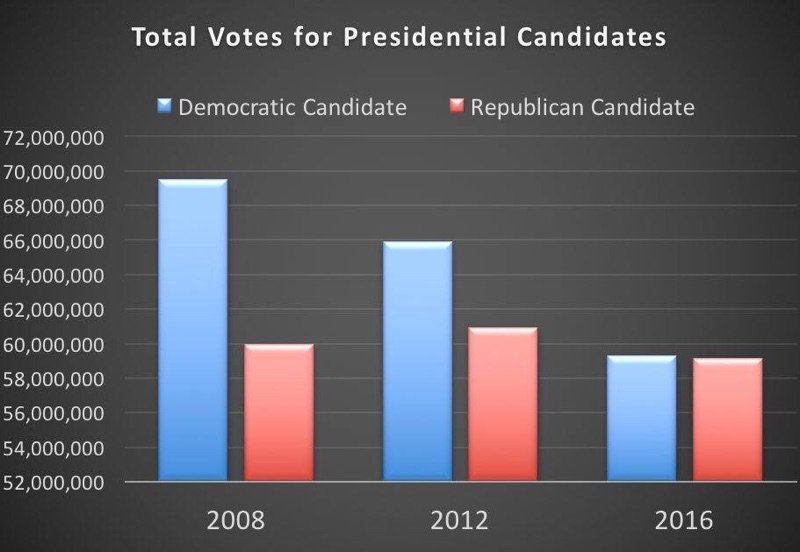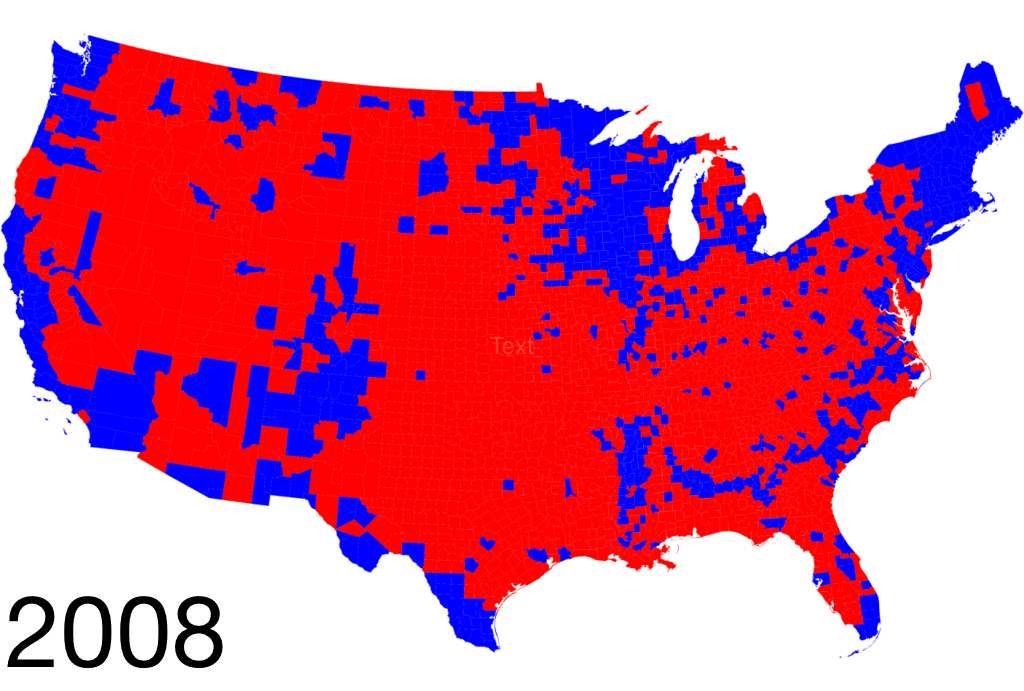On Tuesday, November 8, 2016, some of us voted, and Donald Trump will be the next President of the United States.
While watching the coverage of the election over the last year, I couldn't understand how any rational person could ever vote for someone like Trump, but even the most rational of people can work against their best interests when they feel unfairly treated, as demonstrated in an economic experiment called the ultimatum game1:
The first player (the proposer) receives a sum of money and proposes how to divide the sum between the proposer and the other player. The second player (the responder) chooses to either accept or reject this proposal. If the responder accepts, the money is split according to the proposal. If the responder rejects, neither player receives any money.
The responder typically vetos the deal when low offers are made. People consistently prefer getting nothing to receiving a small share of the pie. Rejecting the offer is in effect paying to punish the proposer.
The reason why this experiment is interesting is because in a completely rational world, the responder would accept any amount of money the proposer offers, because anything is better than nothing, right? Not so fast, we let emotion and passion guide us all the time, especially when we think we're getting a raw deal or feeling betrayed, as Ben Thompson wrote in his daily update after the election2:
People feel the system is unfair, that they don’t have a stake in it, and they are exceptionally mad. This is a sentiment that has been rising for decades thanks to globalization and the increase in manufacturing productivity that devastated so much of the Midwest in particular, but it was dramatically accelerated by the aftermath of the Great Recession [of 2008] when, in the estimation of people where I grew up, Wall Street got off scot-free while everyone else had to bear the pain. I cannot overstate how pervasive and deeply-felt this sentiment is: so many people I know — regardless of income level — deeply believe the system is rigged, so who cares if Trump destroys the whole thing?
David Wong says the same thing (seriously, if you only read one external link from this post, read this one) with a little more color:
They're getting the s**t kicked out of them. I know, I was there. Step outside of the city, and the suicide rate among young people f**king doubles. The recession pounded rural communities, but all the recovery went to the cities. The rate of new businesses opening in rural areas has utterly collapsed.
See, rural jobs used to be based around one big local business -- a factory, a coal mine, etc. When it dies, the town dies. Where I grew up, it was an oil refinery closing that did us in. I was raised in the hollowed-out shell of what the town had once been. The roof of our high school leaked when it rained. Cities can make up for the loss of manufacturing jobs with service jobs -- small towns cannot. That model doesn't work below a certain population density.
If you don't live in one of these small towns, you can't understand the hopelessness. The vast majority of possible careers involve moving to the city, and around every city is now a hundred-foot wall called "Cost of Living."
This sense of loss and unfairness has been rising for decades, but it feels like it has only been in the last eight years or so that this unease has reached the tipping point and started to manifest itself politically, Game Change touches on this unrest boiling to the surface during the 2008 elections:
As the election barreled toward its conclusion, something dark and frightening was unleashed, freed in part by the words of the McCains and Palin. At rallies across the country, there were jagged outbursts of rage and accusations of sedition hurled at Obama...
Colin Powell had been friends with McCain for twenty-five years. The senator had been actively seeking his endorsement ... Powell warned McCain that his greatest reservation was the intolerant tone that seemed to be overtaking the Republican Party. McCain’s selection of Palin bothered Powell because he saw her as polarizing ... And then there were the hate-soaked rallies...
The general’s repudiation was a stinging blow for McCain ... Powell represented the same brand of Republicanism as McCain’s. Tough on defense. Fiscally prudent. Pragmatic and nondoctrinaire. McCain had to wonder what had become of him if his current incarnation was repelling someone like Powell. He was startled by the crazies at his rallies. Who were they? Why were they there? And what did they see in him?
And, indeed, the first Tea Party candidates were elected in 2010, marking the beginning of a new era of political unrest.
Just before the election we packed up the kids and headed south from San Francisco to Disneyland. On our way we passed many a barren field with a sign reading, "congress created dust bowl"

And oftentimes, right next to those dustbowl signs, was a "Farmers for Trump" sign:

Signs like this are usually preaching to the choir though, because as it turns out, America votes by population density, more or less
As cities continue to grow in red states, those cities will become more blue, and ultimately, those states will become more purple, and then blue...
If you follow the red state trend lines, you can clearly see that any dense, fast-growing cities that might emerge in red states will be very likely to vote blue. The few that do already exist already vote blue. How would these new cities be different and [what would] cause them to vote red?
Let's try and answer that question: what would cause cities and/or states to vote red? There really are only two answers:
- More rural voters showing up to vote
- less urban voters showing up to vote
Because if urban voters actually show up and vote, they would overwhelm any national election each and every time.
| Area | Population |
|---|---|
| United States | 308,745,538 |
| Urban | 249,253,271 |
| Rural | 59,492,267 |
So how would you cause more rural voters to vote and less urban voters to vote? On the rural front, the answer seems to be a growing sense of unfairness, tinged with a fair bit of legitimate anger, and topped with a helping of more rural voters actually bothering to vote, in larger and larger numbers, in each election:
In 2008 and 2012, rural voters accounted for only about 19 percent of the vote in the state, but according to preliminary exit poll results, they account for 27 percent of the state’s vote. And Trump does well with those rural voters, winning them by about 15 points.
and this year they were all in on Trump:
Trump leads Democratic rival Hillary Clinton by the commanding margin of 55 percent to 18 percent among farmers with operations of at least 200 acres.
Why would a lifelong urbanite ... enjoy such robust support in the heartland? The answer may lie in The Donald's unmatched ability to deliver an angry, frothing rant. The Agri-Pulse poll finds that 86 percent of respondents reported being somewhat or very dissatisfied with the way things are going in the United States...
As Siena Chrisman recently put it on Civil Eats, "Rural America is mad." She notes that Trump polls strongest in places where "white identity mixes with long-simmering economic dysfunctions," quoting a New York Times analysis. And few places combine embattled white identity and economic stress quite like farm country.
And how would you get urban voters to not show up? Choose some candidates no one is particularly excited about

Look at the effect of urban voters not, you know, actually voting:
In Michigan, where Clinton lost by around 13,000 votes, some analysts estimate that 90,000 Democrats left the top line blank.
Now take the results in Michigan and multiply them across the entire country:
Trump won fewer popular votes than Romney 2012, and was about on par with McCain 2008. Hillary lost 10 MILLION VOTES from Obama 2008.
— Ben Shapiro (@benshapiro) November 9, 2016
Now let's visualize what that all those blue votes disappearing looks like using some 2008 to 2016 county maps (red for Republican, blue for Democrat):

Notice anything? The incredibly shrinking number of blue counties by chance? Particularly among the rust belt cities, which have been hit really really hard over the last 8 years and maybe aren't enamored with the current status quo? So now we know, that's how you get previously blue voting counties to become red.

Now, let's look at some trends, why does rural vote red and cities vote blue? Well, for one, we seem to actually be physically separating ourselves:
heavily urban counties ... were 32 percentage points more Democratic in their voting than the average. The heavily rural counties were about 11 percentage points more Republican...
If you plot every county's urban-versus-rural divide by the per-election average change in the vote, the pattern is clear: more urban areas vote have been voting more Democratic...
What's particularly interesting is to see how each county has changed over time. Notice that urban areas, counties containing cities, have grown more Democratic; the counties surrounding them (usually suburbs) less so....
the political shifts that have emerged as people of like-minded politics have moved into similar and dense areas ... over time, the tension between rural and urban areas in every state could become significant factors in politics, if this polarization continues.
At the same time we're also separating ourselves virtually as well (and the internet makes everything happen faster). Something Awful noticed this clear back in 2004, while talking about Furries and the empowering effect of the internet:
In the endless expanse of communications the Internet is, probably the greatest and most terrible gift it offers to furries ... is the ability to shut themselves off from the mainstream. They huddle in cloisters that are virtually unassailable by the outside world and whisper encouraging things to one another that would be nearly impossible to say in real life. Free from the pressures of society to conform to a boring standard they go in the exact opposite direction, externalizing things that are roughly as far from "normal" as can be expected. Then, within their protected virtual enclaves, they declare these things to be the norm. By declaring their perversions, mores, and general imbecility to be their own status quo they have simultaneously validated their own existence and demonstrated the inferiority of outsiders.
This makes it hard to see the other side's viewpoint:
It seems that people just don’t want to compromise on anything anymore, and it seems to be getting worse and worse with each and every year, people are clustering to their respective side and refusing to venture towards the middle for any reason...
When you can surround yourself with a community that only shares your beliefs, you have a recipe for killing any and all compromise, why should I ever try and see your point of view when all my peeps over here are yelling and screaming that you suck?
This is entirely in line with Ben Thompson's aggregation theory:
in an aggregated world it is voters aka users who decide which issues get traction and which don’t. And, by extension, the most successful politicians in an aggregated world are not those who serve the party but rather those who tell voters what they most want to hear.
Which also follows Ezra Klein's observations:
It’s tempting to imagine that rising political polarization is just a temporary blip and America will soon return to a calmer, friendlier political system. Don’t bet on it. Political polarization maps onto more than just politics. It’s changing where people live, what they watch, and who they see — and, in all cases, it’s changing those things in ways that lead to more political polarization, particularly among the people who are already most politically polarized…
It’s easy to see how this could work to strengthen polarization over time ... people become more extreme when they’re around others who share their beliefs. If liberals and conservatives end up moving to different places and surrounding themselves with others like them they’re likely to pull yet further apart. And even for those who can’t move, the internet makes it easy to settle in a virtual neighborhood with people who agree with you. Polarization is going to get a lot worse before it starts getting better.
And as people have separated into new segregated physical and virtual communities, they don't seem to be listening to traditional gatekeepers anymore:
"I've been endorsed by over 70 newspapers,” the Ohio governor [John kasich] said. “Wish it mattered."
Hillary Clinton also fell victim to how little traditional gatekeepers mattered:
Hillary Clinton had just about every single endorsement from newspapers and magazines across the country – as well as a majority of mainstream TV personalities – on her side, even if reluctantly. And it meant nothing at all.
And not only are people no longer listening to traditional gatekeepers, they are actively preventing established power structures from taking control from them:
Republican voters ultimately did go for Trump, however. In fact, they intervened to wrest control of the nomination back from the delegates. Until just a few weeks ago, Trump’s position had stagnated in national polls and in state-by-state results; before New York on April 19, he’d yet to win a majority in any state, lending credence to the idea that he might have a “ceiling” (albeit a higher ceiling than some originally expected) on his support. From New York onward, however, Trump has won a majority in every state ... with a sudden lunge upward after Wisconsin, rather than a smooth upward projection.
What happened after Wisconsin? My theory ... is that Republican voters were swayed by Trump’s arguments that the candidate with the most votes and delegates should be the nominee ... Some voters might have preferred Cruz or John Kasich to Trump in the abstract, but not at the expense of a contested convention in which the plurality winner would be denied the nomination and replaced with another flawed candidate.
A few weeks back I had the privilege of talking to a well known CEO, as the topic turned to politics, he talked about how Trump would never win, but when I pointed out that the people who voted for him don't actually go away when the election is over, he responded with, "yeah, what are they going to do about it?"3
A few days after the election, while talking to another CEO about the election, he asked, "what are we going to do about it?" Hopefully, this election marks a change of attitude for a lot of people (and a smidgen of empathy would be nice also), and the beginning of something great, because change rarely happens during times of political stability, but can come fast during times of instability, my hope is that any change is is ultimately positive, not just for a privileged few Americans, but for every american, in every state.
In the end, for all Trump's talk about how the election is rigged, I think we've just seen the best possible proof it is not. That ultimately, people will be heard, and how important each person's vote really is.
Supplementary Material
From Hitmakers:
With the rise of alternative media sources, party elites lost their ability to control the flow of political information to voters, and an unprecedented figure of single-minded celebrity, authoritarian bluster, and nativist bombast ran away with the Republican primary. The party didn’t decide. Rather, like the concentration of political media itself, it seemed to dissolve.
-
the included quote is a mashup of this and this Wikipedia page. ↩
-
Paywalled, but worth the price of admission! ↩
-
When I started writing this post I thought Trump was going to lose, and I was going to use this story as a means of talking about how when people are really angry, what they do is start revolutions: like The American Revolution, and the French Revolution, and the American Civil War. ↩

